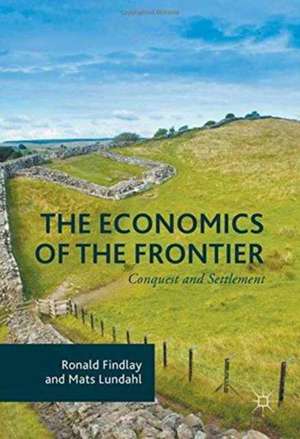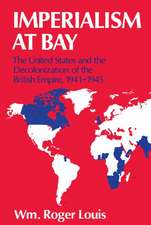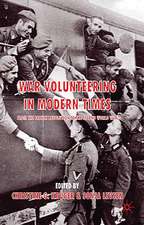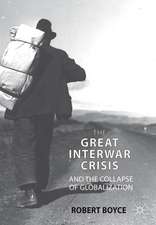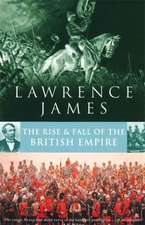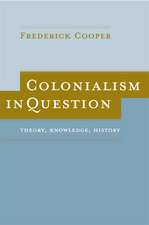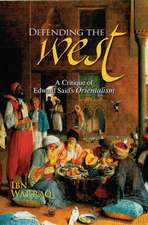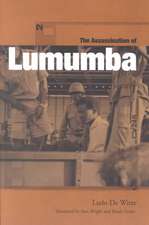The Economics of the Frontier: Conquest and Settlement
Autor Ronald Findlay, Mats Lundahlen Limba Engleză Hardback – 25 noi 2016
The Economics of the Frontier brings together a collection of essays which explore how economically optimal frontiers were founded from sixth-century Europe through to twentieth-century Brazil.
| Toate formatele și edițiile | Preț | Express |
|---|---|---|
| Paperback (1) | 785.74 lei 6-8 săpt. | |
| Palgrave Macmillan UK – 27 iun 2018 | 785.74 lei 6-8 săpt. | |
| Hardback (1) | 790.28 lei 6-8 săpt. | |
| Palgrave Macmillan UK – 25 noi 2016 | 790.28 lei 6-8 săpt. |
Preț: 790.28 lei
Preț vechi: 963.76 lei
-18% Nou
Puncte Express: 1185
Preț estimativ în valută:
151.23€ • 156.94$ • 126.41£
151.23€ • 156.94$ • 126.41£
Carte tipărită la comandă
Livrare economică 17-31 martie
Preluare comenzi: 021 569.72.76
Specificații
ISBN-13: 9781137602367
ISBN-10: 1137602368
Pagini: 320
Ilustrații: XIV, 448 p. 27 illus.
Dimensiuni: 148 x 210 x 29 mm
Greutate: 0.68 kg
Ediția:1st ed. 2017
Editura: Palgrave Macmillan UK
Colecția Palgrave Macmillan
Locul publicării:London, United Kingdom
ISBN-10: 1137602368
Pagini: 320
Ilustrații: XIV, 448 p. 27 illus.
Dimensiuni: 148 x 210 x 29 mm
Greutate: 0.68 kg
Ediția:1st ed. 2017
Editura: Palgrave Macmillan UK
Colecția Palgrave Macmillan
Locul publicării:London, United Kingdom
Cuprins
Introduction: Frontiers and Empires.- 1. Frontiers and Empires in Historical Perspective.- 2. Modeling Global Interdependence: Centers, Peripheries and Frontiers.- 3. Towards a Model of Territorial Expansion and the Limits of Empire.- 4. Demographic Shocks and the Factor Proportions Model: From the Plague of Justinian to the Black Death.- 5. The First Globalization Episode: The Creation of the Mongol Empire or the Economics of Chinggis Khan.- 6. Towards a Factor Proportions Approach to Economic History: Population, Precious Metals, and Prices from the Black Death to the Price Revolution.- 7. International Trade and Factor Mobility with an Endogenous Land Frontier: Some General Equilibrium Consequences of Christopher Columbus.- 8. Natural Resources, 'Vent-for-Surplus' and the Staples Theory.- 9. Resource-Led Growth – A Long-Term Perspective: The Relevance of the 1870–1914 Experience for Today's Development Economies.- 10. Lampião and the Colonels: On the Political Economy of Banditry.- Epilogue: Frontiers – Theory and History.
Notă biografică
Ronald Findlay is Ragnar Nurkse Professor Emeritus of Economics at Columbia University, USA. His main research fields are international economics, development economics, economic history, and economic theory.
Mats Lundahl is Professor Emeritus of Development Economics at the Stockholm School of Economics, Sweden. His main research fields are development economics, international economics, economic history, history of economic doctrines, and agricultural economics.
Mats Lundahl is Professor Emeritus of Development Economics at the Stockholm School of Economics, Sweden. His main research fields are development economics, international economics, economic history, history of economic doctrines, and agricultural economics.
Textul de pe ultima copertă
This book deals with the economics of establishing a frontier by conquest or by peaceful settlement, the costs involved, and the optimum extension of the territory. The opening chapters discuss the most relevant literature about frontiers – conceptual, theoretical and empirical – and introduce the fundamental theoretical model for extending frontiers which is drawn on throughout the book. The authors use this theoretical apparatus by applying it to a number of historical cases. These include the division of the European territory between the Byzantine Empire, Islam and Western Europe, the creation and expansion of the Mongol Empire, the impact of the Black Death, the European discovery of the New World, the staples trade from 1870–1914, and the rise and fall of banditry in Brazil.
The Economics of the Frontier brings together a collection of essays which explore how economically optimal frontiers were founded from sixth-century Europe through to twentieth-century Brazil.
The Economics of the Frontier brings together a collection of essays which explore how economically optimal frontiers were founded from sixth-century Europe through to twentieth-century Brazil.
Caracteristici
Develops a theoretical foundation for the optimal extension of empire Applies neoclassical general equilibrium theory to a series of historical episodes which all define or change a frontier Contains a survey of the most relevant conceptual and theoretical issues in the literature about frontiers
